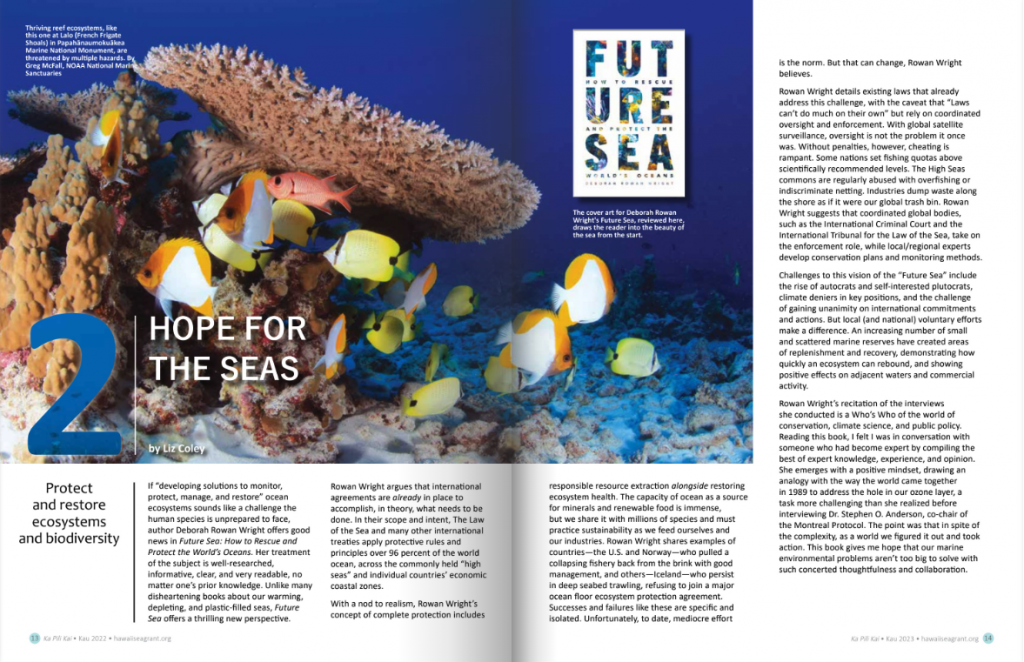If “developing solutions to monitor, protect, manage, and restore” ocean ecosystems sounds like a challenge the human species is unprepared to face, author Deborah Rowan Wright offers good news in Future Sea: How to Rescue and Protect the World’s Oceans. Her treatment of the subject is well-researched, informative, clear, and very readable, no matter one’s prior knowledge. Unlike many disheartening books about our warming, depleting, and plastic-filled seas, Future Sea offers a thrilling new perspective.
Rowan Wright argues that international agreements are already in place to accomplish, in theory, what needs to be done. In their scope and intent, The Law of the Sea and many other international treaties apply protective rules and principles over 96 percent of the world ocean, across the commonly held “high seas” and individual countries’ economic coastal zones.
With a nod to realism, Rowan Wright’s concept of complete protection includes responsible resource extraction alongside restoring ecosystem health. The capacity of ocean as a source for minerals and renewable food is immense, but we share it with millions of species and must practice sustainability as we feed ourselves and our industries. Rowan Wright shares examples of countries—the U.S. and Norway—who pulled a collapsing fishery back from the brink with good management, and others—Iceland—who persist in deep seabed trawling, refusing to join a major ocean floor ecosystem protection agreement. Successes and failures like these are specific and isolated. Unfortunately, to date, mediocre effort is the norm. But that can change, Rowan Wright believes.
Rowan Wright details existing laws that already address this challenge, with the caveat that “Laws can’t do much on their own” but rely on coordinated oversight and enforcement. With global satellite surveillance, oversight is not the problem it once was. Without penalties, however, cheating is rampant. Some nations set fishing quotas above scientifically recommended levels. The High Seas commons are regularly abused with overfishing or indiscriminate netting. Industries dump waste along the shore as if it were our global trash bin. Rowan Wright suggests that coordinated global bodies, such as the International Criminal Court and the International Tribunal for the Law of the Sea, take on the enforcement role, while local/regional experts develop conservation plans and monitoring methods.
Challenges to this vision of the “Future Sea” include the rise of autocrats and self-interested plutocrats, climate deniers in key positions, and the challenge of gaining unanimity on international commitments and actions. But local (and national) voluntary efforts make a difference. An increasing number of small and scattered marine reserves have created areas of replenishment and recovery, demonstrating how quickly an ecosystem can rebound, and showing positive effects on adjacent waters and commercial activity.
Rowan Wright’s recitation of the interviews she conducted is a Who’s Who of the world of conservation, climate science, and public policy. Reading this book, I felt I was in conversation with someone who had become expert by compiling the best of expert knowledge, experience, and opinion. She emerges with a positive mindset, drawing an analogy with the way the world came together in 1989 to address the hole in our ozone layer, a task more challenging than she realized before interviewing Dr. Stephen O. Anderson, co-chair of the Montreal Protocol. The point was that in spite of the complexity, as a world we figured it out and took action. This book gives me hope that our marine environmental problems aren’t too big to solve with such concerted thoughtfulness and collaboration.
Browse Ka Pili Kai issues HERE


